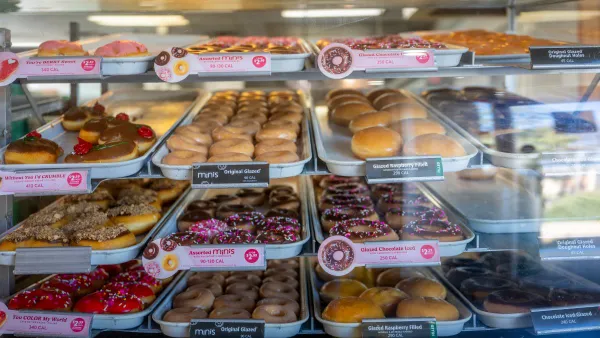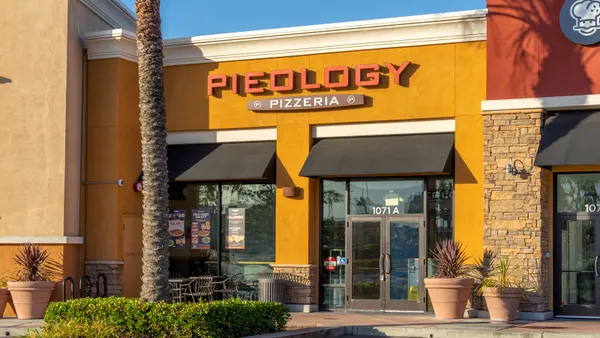UPDATE: June 1, 2021: Krispy Kreme filed for a $100 million initial public offering on Tuesday. The donut chain will trade on Nasdaq under the ticker symbol DNUT.
Krispy Kreme will use the net proceeds gained from the offering to pay off outstanding debt under a 2019 revolving credit facility, according to a Form S-1 document. The company has $1.2 billion in total debt, and reported $3 million in losses for the quarter ended April 4. The chain's revenue rose 23% to $321.8 million for the period.
Dive Brief:
- Krispy Kreme said Tuesday it has confidentially filed a registration statement on Form S-1 with the U.S. Securities and Exchange Commission to go public, according to a press release.
- The number of shares and price of an initial public offering have yet to be determined. The IPO is expected to take place after the SEC completes its review process, subject to market and other conditions. Krispy Kreme would not offer a comment beyond the press release.
- The doughnut chain would become the first restaurant chain to offer a traditional IPO since Muscle Maker Grill went public in 2020 and Kura Sushi went public in 2019. Torchy's Tacos and Dutch Bros Coffee are also reportedly considering IPOs.
Dive Insight:
Krispy Kreme was previously a public company until 2016 when JAB Holdings acquired the chain for about $1.35 billion. The company's last foray as a public company, which began in 2001, started strong with company's shares priced at $50 each just a few years after its IPO, according to Mashed.
But by 2004, the company's luck changed and profits turned into losses. It expanded too quickly and the addition of its boxed donuts in over 20,000 grocery stores resulted in oversaturation, according to The New York Times. That meant new openings, which originally resulted in long lines from eager fans, were barely met with much excitement. A year later, a 24-page report revealed the chain was fraught with accounting errors and failed to meet its financial reporting obligations.
Due to this investigation, the company wasn't allowed to expand domestically until its finances were in order, but under then-CEO Daryl Brewster, the chain pushed for international expansion, which was still allowed, according to Mashed. Expanding internationally gave the company a boost in capital to help it get out of its initial financial mess.
The company's financial circumstances improved under JAB Holdings, increasing global sales by 58% to $960 million since 2015, according to Technomic data as reported by Restaurant Business. Krispy Kreme has also been growing unit counts and testing new prototypes.
Last year, the doughnut chain saw a boost in same-store sales despite giving away millions of doughnuts during the pandemic, according to Yahoo Finance. Many of its non-urban locations offer drive-thrus as well, which CMO Dave Skena told Business Insider "were a real lifeline" while its dining rooms were closed. The company also bet on New York City's restaurant scene returning with a delayed opening of its experiential flagship store in Times Square despite so many others restaurant companies moving away from dense metropolitan areas.
Its new public offering comes at a time when investors appear to be optimistic about the future of the restaurant industry despite a challenging 2020. With over 110,000 restaurant closures last year, those that survived are capitalizing on growth opportunities and capturing pent-up consumer demand.









